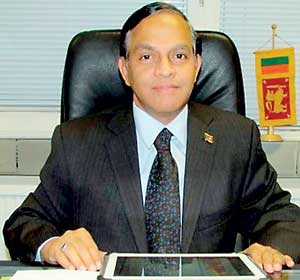Sunday Feb 22, 2026
Sunday Feb 22, 2026
Friday, 17 July 2015 00:40 - - {{hitsCtrl.values.hits}}
At the 48th Annual Session of UNCITRAL held this week, Sri Lanka’s Ambassador in Austria and Permanent Representative to the UN in Vienna A.L. Abdul Azeez has said that Sri Lanka is maximising the use and promotion of Information and Communication Technologies to the benefit of its people.
He made this statement following Sri Lanka’s ratification of the UN Electronic Communications Convention during the 48th annual session of the United Nations Commission on International Trade Law (UNCITRAL) held in Vienna, Austria last week.
Sri Lanka is the first country in South Asia and second country after Singapore to become a State Party to the Convention.
Ambassador Azeez made an elaborate country statement: “Sri Lanka with a recorded history of 2,500 years is today a country in revival. Democratic values, echoing transparency, accountability together with principles of good governance are the key pillars on which our country is moving forward today, where the true potential of Information and Communication Technologies (ICTs) is being maximised for the benefit of its people.”
Speaking further, Azeez said: “It is important to record the significant advancements made by Sri Lanka in the field of ICTs. For several years Sri Lanka ranks No. 1 in South Asia in the Networked Readiness Index (NRI), published jointly by the World Economic Forum & INSEAD in France. Last year, Sri Lanka’s ranking in the UN e-Government Readiness Index jumped 41 places bringing it to the No. 1 position in South Asia. This was a landmark achievement for our country.”
“Substantial investments have already been made in the deployment of ICTs for technological and institutional transformation of key sectors of the economy under the internationally acclaimed ‘e-Sri Lanka Development initiative,’ supported by the World Bank. Peace, growth and equity were our goals. A large number of Government services are now available online to citizens through our country portal (LankaGate), facilitated by the Information and Communication Technology Agency (ICTA). Visitors to Sri Lanka can obtain visas on the internet – the facilitating legal framework, e-government and e-commerce is in place,” the Ambassador stated.
Azeez went on to state: “Sri Lanka is committed towards harnessing the full potential of ICT and using the highly-educated human resource for the development of our country. Through e-government led reforms we will work towards greater transparency, efficiency and accountability. With access to latest mobile broadband technologies across the country, Sri Lanka’s internet expansion has been exponential. It is our firm belief that our people should be able to use the internet with freedom and confidence.”
“As part of our Government’s 100 day program we have ensured that access to free Wi-Fi is a citizen’s right. This free Wi-Fi program which brought together all operators into one platform is already functioning in several key locations across the country. We hope to have 1,000 hotspots active in public places in the coming months. We believe that access to high quality internet is a pre-requisite to enabling freedom of expression, enhancing the skills of our people and ensuring socio economic growth,” the Ambassador noted.
Azeez further stated: “Whilst providing enhanced access to the internet, my country is eager to combat criminal activities on the internet. A lot of policy and institutional measures have been adopted in Sri Lanka. The Computer Crimes Act No. 24 of 2007 and our national Sri Lanka CERT are internationally recognised. In February 2015, Sri Lanka was invited to join the Budapest Cyber Crime Convention by the Council of Europe and we acceded to this Convention on 29 May. In this overall context I consider it timely that my country ratified the UN Electronic Communications Convention, the only Convention on the subject of electronic commerce prepared by UNCITRAL.”
Elaborating on the historical adoption of UNICTRAL texts by Sri Lanka, Ambassador Azeez said: “Sri Lanka has had a long history of supporting the work of UNCITRAL and adopting its legal texts. We ratified the New York Convention in 1962 and in the formulation and enactment of our Arbitration Act (1995), Sri Lanka adopted the features of the ‘UNCITRAL Model Law on International Commercial Arbitration (1985)’. In the formulation of our Secured Transactions Act (2009) we have used the features of the UNCITRAL Legislative Guide on Secured Transactions (2007), becoming one of the first to do so. During the early drafting stages of our Electronic Transactions Act No. 19 of 2006, Sri Lanka had the opportunity of sending a delegation to take part in the Sessions of UNCITRAL Working Group on e-Commerce, which negotiated UN Electronic Communications Convention. This delegation consisted of the Legal Draftsperson of Sri Lanka and ICTA’s Legal Advisor. Due to our active participation in these sessions, Sri Lanka greatly benefited from the work of UNCITRAL as well as expertise from the UNCITRAL, to which we are thankful to UNCITRAL.”
“Sri Lanka has also benefitted from support extended to us by UNCITRAL Regional Centre for Asia and the Pacific, based in Incheon, Republic of Korea. In September 2014, Sri Lanka was able to co-host the first ever UNCITRAL South Asia Conference, covering the subjects of ‘Electronic Commerce & Secured Transactions,’ thanks to the generous support and leadership of the UNCITRAL Regional Centre for Asia and Pacific. International experts from China, India, Japan, Australia, Singapore, Iran, Vietnam, Maldives and Nepal as well as representatives from UNCITRAL, the World Bank Group, UN ESCAP and the Hague Conference on Private International Law, addressed this conference. We wish to place our deep appreciation for the committed support and leadership provided to Countries in the Asian region by the UNCITRAL Regional Centre, thanks to the generosity and the goodwill extended by the Government of Republic of Korea,” the Ambassador concluded.